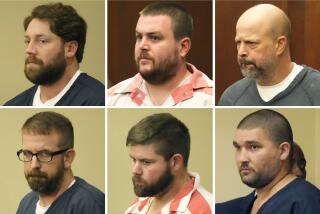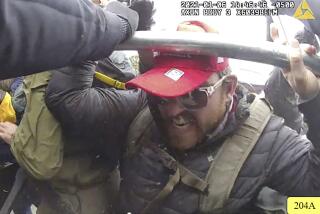Top-Ranked Abu Ghraib Soldier Gets 8 Years in Prison
The highest-ranking soldier charged with beating and humiliating Iraqi detainees at the Abu Ghraib prison and snapping keepsake photos of the deeds was sentenced in military court today to eight years in prison for abusing detainees.
Staff Sgt. Ivan L. “Chip” Frederick II, 38, an Army reservist and night supervisor at the prison, was demoted by the military, forfeited his salary and received a dishonorable discharge.
Frederick pleaded guilty in military court Wednesday to assault, maltreatment, dereliction of duty, indecent acts and conspiracy. He confessed to the charges as part of a plea deal. Prosecutors agreed to drop other counts in exchange for his cooperation in future courts-martial.
In calm, confident tones, Frederick told the court at a U.S. military base in Baghdad that he had twisted a loose wire around the finger of a blindfolded detainee and threatened to electrocute the man if he teetered off a box — though there was no real danger. He described how he had helped to throw naked prisoners into a pile and watched as other soldiers jumped on them and stomped on their fingers and toes.
He also said he punched one detainee in the chest, causing him to collapse, then ordered him to perform a sexual act in front of soldiers and prisoners “just to humiliate him.”
“I was wrong about what I did and I shouldn’t have done it,” Frederick told Army Col. James Pohl, the judge. “I knew it was wrong at the time because it was a form of abuse.” His behavior, he said, “makes the Army look bad.”
Frederick described the atmosphere at Abu Ghraib, west of Baghdad, as one of enormous stress and few regulations. He said he never understood exactly who was in charge of the prison.
Upon entering the prison for the first time last fall, Frederick said, he saw naked men handcuffed to cell doors and others wearing nothing but women’s underwear. These forms of humiliation were ordered by military intelligence officers, he said, because they wanted prisoners to be compliant during interrogations.
“Nudity was to humiliate and degrade them for military intelligence purposes,” Frederick said. “It was very embarrassing for an Arabic male to be seen nude by another.”
Before becoming involved in the abuse of prisoners, Frederick said, he asked for manuals on operating procedures and was told that there weren’t any.
He also said that Iraqi police working at Abu Ghraib collaborated with prisoners, smuggling in drugs, maps of the facility, clothes, weapons and ammunition.
In one incident around Thanksgiving, a Syrian prisoner opened fire on guards with a gun given to him by an Iraqi policeman, Frederick said.
“It turned into a nightmare from there,” he said. “People were running everywhere screaming. There were dogs barking. We were searching the cells for weapons. It was total chaos.”
Frederick — a resident of Buckingham, Va., and a Virginia state prison guard in civilian life — is one of seven members of the Army Reserve’s 372nd Military Police Company based in Cresaptown, Md., to be charged in the scandal. Another, Spc. Jeremy C. Sivits, in his mid-20s, of Hyndman, Pa., is serving a one-year prison sentence after pleading guilty in May to three counts.
A military intelligence soldier, Spc. Armin J. Cruz, 24, was sentenced in September to eight months in prison, a reduction in rank to private and a bad-conduct discharge for his role in the abuse.
Last month, Defense Secretary Donald H. Rumsfeld said that 45 people had been referred for courts-martial in the Abu Ghraib case and that 12 letters of reprimand had been issued to officers.
Investigators began looking into allegations of abuse at Abu Ghraib in January, when a soldier slipped copies of the photographs under their door. In April, the images were leaked to the media and published worldwide, to great condemnation.
About a dozen inquiries into the abuse were launched. In the earliest stages of the scandal, top Bush administration officials sought to blame a small band of low-ranking soldiers for the abuse, but a Pentagon investigation completed in August concluded that more than three dozen military intelligence officers, their commanders, CIA agents and Pentagon contractors were also involved.
A separate inquiry, also completed in August, faulted top officials, including Rumsfeld and Army Lt. Gen. Ricardo Sanchez, the former commander of ground forces in Iraq, for failing to lay down consistent and specific policies on treatment of detainees and for failing to properly train and staff units to guard and interrogate prisoners. No senior officials, however, have been fired. In fact, Rumsfeld has privately told colleagues he intends to award Sanchez a fourth star.
Initially, Frederick faced possible punishment of 18 years in prison, loss of pay, demotion and a dishonorable discharge if convicted of all counts. He now will face less because some charges were dropped in the plea deal.
Among the most notorious instances of abuse that Frederick confessed to occurred Nov. 4, when he took wires dangling from a shower and placed them on the hooded detainee’s hands and told him he would be electrocuted if he fell off the box. The photos that Frederick and other soldiers then snapped of the incident were later published around the globe. Frederick told the judge that he took the pictures for himself and not interrogation purposes.
Concerning another incident, on Nov. 8, Frederick admitted that he joined a fellow soldier who jumped on a pile of seven prisoners who had been accused of rioting. Frederick said the soldiers stomped on the prisoners’ hands and feet, adding, “I should have stopped it right there.”
Frederick said he singled out one victim for additional punishment. “I stood him up and punched him in the chest. I was angry. They told me he was the ringleader. He hit a female soldier in the face with a rock,” Frederick said.
The prisoner collapsed and was checked by a female medic, who announced that the man was “faking.” Frederick then told the prisoner to masturbate. “I grabbed his arm by the elbow, put it on his genitals and moved it back and forth with an arm motion, and he did it,” he said.
Once again, Frederick and the other soldiers photographed the spectacle.
The most emotional moment in the day’s proceedings occurred when that former prisoner was brought into court to describe the incident.
The witness, whose identity was withheld by the U.S. military, said that when he was thrown into the pile of screaming men, he felt someone placing his foot on his head, but he could not see whom.
“He put his whole weight on my head and on my knee. I was screaming and crying,” the prisoner said.
The prisoner, who was jailed on suspicion of car theft, said that he was still haunted by the experience.
“I was crying. I wanted to kill myself,” he said. The witness then put his head down on the stand and remained silent for a minute or two, unable to speak. When he regained his composure, he said that he and the other men were then taken to a cell flooded with water and told to sleep naked there, with bags over their heads.
“I felt humiliated, but I had nothing to kill myself with,” he told the court.
The judge asked Frederick whether he ever thought to report the abuse he observed at Abu Ghraib. He said no. “I didn’t think anyone cared about what happened to detainees as long as they didn’t die,” Frederick said.
The soldier also said he was afraid of what would happen to him if he spoke out.
“I was afraid of retaliation by other soldiers,” he said. “We all walked around with loaded weapons. It was very high stress.”
Times Staff Writer Daryl Strickland contributed to this report, along with Times wire services.
More to Read
Start your day right
Sign up for Essential California for news, features and recommendations from the L.A. Times and beyond in your inbox six days a week.
You may occasionally receive promotional content from the Los Angeles Times.







